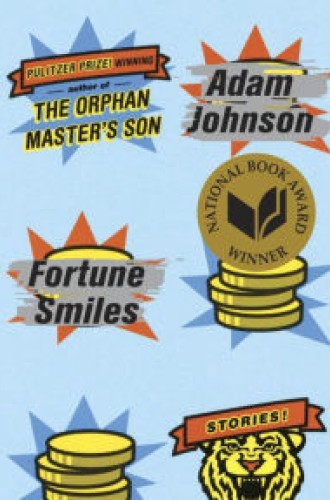Morality transformed
The delight I felt while reading this book needs further interrogation, because its stories deal with troublesome subjects.
One of the things that delighted and confounded me about Adam Johnson’s Pulitzer Prize–winning novel, The Orphan Master’s Son, was its strange combination of the real and the unreal. On the surface I appeared to be reading a realist novel about North Korea. But almost immediately, something in the language clued me in that this was also a dystopian fantasy along the lines of George Orwell. Propaganda and “real life” were twisted together into a rope to which readers were asked to cling. Johnson gave me some perception of what it might be like for the people of North Korea to live amidst such fiercely controlling messages from the Dear Leader, but the book also challenged my assumptions about how to read it.
Because we are so well trained in the literary mechanisms of realism, most readers use that as their reading strategy: they expect literary books to reflect the world as it is in crucial ways. Fiction plays against a backdrop of what we have agreed signifies real life. I said to a friend who was avidly defending the book’s realism against my sense that it was something else, “What about all of the kidnapping? If North Koreans were trawling the coast of Japan randomly kidnapping people, wouldn’t we know about it?” “I Googled it,” she said. “It’s true. North Korea is known for its kidnapping program.” She was right. I Googled it too. I also Googled how much time Adam Johnson had spent in North Korea and several other aspects of the book, trying to get my footing. I still don’t think it is a work of literary realism.
Read our latest issue or browse back issues.
Most of the short stories in Johnson’s new collection play with the same wobbly sense of reality that so captivated and puzzled me in The Orphan Master’s Son. In the opening story, “Nirvana,” a woman is debilitated by a nerve disease. Her husband’s coping strategy is to invent a simulacrum of a dead president that he talks to about his dilemmas. The president answers him with clichés and politically infused aphorisms. I found myself trying to map the story onto present-day political or social realities, but eventually I gave way to the story’s own interior truth. This is a story about two people, neither of them particularly wise or mature, who are forced to grapple with a disease as it reshapes their love for each other.
In “Interesting Facts,” a woman whose husband has just won a Pulitzer Prize for a novel about North Korea is dying (or has already died) from breast cancer. Here Johnson bends the realms of thought and action so much that I couldn’t tell what was happening to whom and when. But instead of being frustrating, the experience of entering this woman’s life and mind is intriguing. The wife, thinking about her husband, concludes, “He doesn’t know a teaspoon of the crazy in my head.” This admission speaks something essential about the nature of intimacy—how much of the crazy in each other’s heads do we know?
The delight I experienced in reading this book needs further interrogation, however, because these stories deal relentlessly with dark subjects: debilitating disease, child abandonment, child pornography, and the legacy of the cold war. Each story seems to up the ante for the reader’s willingness to engage in its imaginative project. Almost always that project is empathy—but it’s a demanding form of empathy. How far can you walk inside the head of a man who oversaw a Stasi prison, was directly involved in the torture of its prisoners, and won’t admit it? How about a man whose involvement in child pornography has arranged every detail of his life? Johnson does not go easy on his readers, and I talked to more than one person who had put the book down. It seems heartless of Johnson to ask so much of readers.
But gradually it dawned on me that the picture of human nature Johnson paints is weirdly optimistic. In these stories the human heart often acts against the narrator’s wishes, leading a contorted person on a straighter path than he or she could have created—a version of Edgar Allen Poe’s “The Tell-Tale Heart.”
It’s not that there are happy endings. But even amidst death and torture one can say, tentatively, if one has been able to stay with the dark scenario, that love wins out.
In “George Orwell Was a Friend of Mine,” the East German prison warden continues to visit the prison where he was once in charge even after it has been turned into a “torture museum.” For most of the story the warden clings to his version of the truth, although it is challenged by almost everyone he meets. Eventually he decides to make a video and put it on the Internet so that he can tell the world his version and contradict all the “lies” told in the new era. But in the making of the video, his certainties begin to unravel. The story does not have a happy ending (or does it?), but the heart of the prison warden is on a quest for truth even if that truth will destroy him. It also might save him.
“Are we dealing with one of the good guys or one of the bad?” a police officer asks in another story, “Dark Meadow.” “Information is information,” the other character answers, refusing the moral project that the officer presents. In a story like this, Johnson does not make clear where the empathy of the reader should lie. He doesn’t, like a lot of realist writers, blur the line between good guys and bad guys. Instead he takes the reader so deeply into the experience of a “bad guy” that evil is potentially transformed into love; judgment is eclipsed by the reader’s own growing capacity for discernment. The effect of these stories is moral, but always in unanticipated ways. It’s the reader, perhaps, who faces the final, uncomfortable interrogation.







